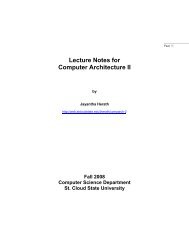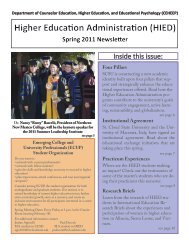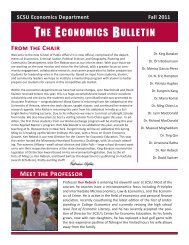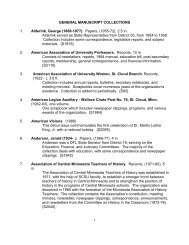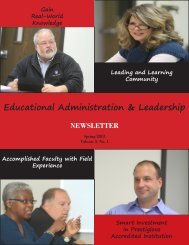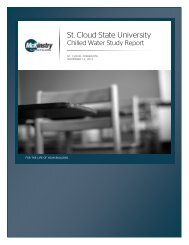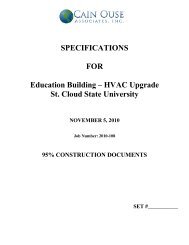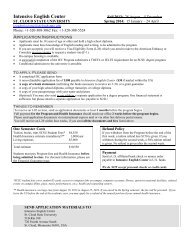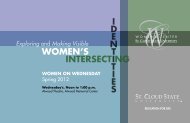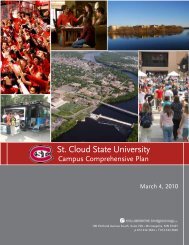2008 Proceedings - St. Cloud State University
2008 Proceedings - St. Cloud State University
2008 Proceedings - St. Cloud State University
You also want an ePaper? Increase the reach of your titles
YUMPU automatically turns print PDFs into web optimized ePapers that Google loves.
Abstracts<br />
Session ZB Emerging Trends in Science Mississippi<br />
Harmful Effects of Nano Tubes on the Environment and Organisms Bodies<br />
The evolution of technology is being reflected in the science of nanoscale manufacturing/engineering processes. A very promising area<br />
indeed. Nanotechnology finds applications in both the industrial world and the biological fields (including the medical and the agricultural<br />
sectors) by utilizing small fiber tubes 1/50 000th of the size of a human hair. They can be fundamentally carbon, mineral or DNA-based.<br />
The major portion of the manufactured tubes is carbon-based and they resemble pencil lead in composition. The question is how a living<br />
organism handles those tubes after injection. If they resemble graphite, then our body cannot digest it. We will attempt to explore this<br />
question. This presentation based on literature review of journal as recent as <strong>2008</strong> will focus on the advances the scientific community has<br />
made, particularly on the synthesis of the carbon nanotubes, their novelty usage in possible drug delivery system and promising HIV-1<br />
vaccines, as well as the negative physiological effects it can have on tissues and more particularly lungs and the respiratory tract in both<br />
humans and animals.<br />
Presentation Index: ZB2<br />
Time: 3:50 p.m.<br />
Department: Chemistry<br />
Project Sponsor(s):<br />
<strong>St</strong>udent Presenter(s): Pickrell, Charles; Nang, Quincy; Meyer, Andrew<br />
Sadrai, Mahin<br />
Session ZC Education Granite<br />
The Experiences of <strong>St</strong>udents with Disabilities in a United <strong>St</strong>ates Public Higher Education Institution<br />
This study examined the experiences students with disabilities encounter in their interactions with faculty members and adaptive service<br />
providers, within a public higher education institution. Also investigated was how these encounters affect the students with disabilities in<br />
attaining their educational goals. The theoretical framework for this study was the learning theory. Three basic assumptions were applied.<br />
First, stereotypes of disability affect the performance of students with disabilities. Second, positive and negative behaviors and actions of<br />
faculty members and service providers affect performance. Third, disability barriers are compounded by negative encounters. In-depth<br />
interviews were administered to a small but diverse group of students with disabilities. Data were analyzed by searching for narrative<br />
themes. The results suggested that students with disabilities experienced positive and negative behaviors and actions when interacting<br />
with faculty members and adaptive service providers. These experiences affected their ability to succeed. Negative experiences resulted in<br />
reduced self-esteem, lower grades, and the need to retake classes. Positive experiences lead to increased self-confidence, feelings of<br />
acceptance and greater learning.<br />
Presentation Index: ZC1<br />
Time: 5:00 p.m.<br />
Department: Human Relations and Multicultural Education<br />
Project Sponsor(s):<br />
<strong>St</strong>udent Presenter(s): Holtan, Lisa<br />
Andrzejewski, Julie<br />
Pragmatic Rationality within the Prisoner's Dilemma<br />
The Prisoner‘s Dilemma is a classic problem encountered in Game and Decision Theory. Any solution to the Prisoner‘s Dilemma will have<br />
far reaching implications in economics, evolutionary theory, ethics and foreign relations, to name only a few disciplines. In this paper, I<br />
present the problem and implications of the Prisoner‘s Dilemma. After I present the problem, I present two solutions to the Prisoner‘s<br />
Dilemma: The Egoists and the Altruists solution. I argue against the Egoist solution, while defending the Altruists solution to the Prisoner‘s<br />
Dilemma.<br />
Presentation Index: ZC2<br />
Time: 5:20 p.m.<br />
Department: Philosophy<br />
Project Sponsor(s):<br />
<strong>St</strong>udent Presenter(s): Coss, David<br />
Shaffer, Michael<br />
The Significance and Implementation of Vocabulary Instruction<br />
Vocabulary instruction is an essential and indispensable branch of English and Language Arts. It is home to the phenomenon of word<br />
acquisition, in addition to extensive research regarding how humans grasp words and language, why they grasp it and how educators can<br />
maximize the tools available to them to assist students in learning and using vocabulary. In this paper, I examine a number of critical<br />
studies central to vocabulary instruction aimed at adolescent learners. The studies that are examined concern vocabulary acquisition, the<br />
role of context in learning new words, and the effectiveness of varying vocabulary teaching strategies. These studies have been conducted<br />
to help demystify vocabulary acquisition. The benefits of having an extensive vocabulary are invaluable, as discussed in the examined<br />
studies and in this paper.<br />
Presentation Index: ZC3<br />
Time: 5:40 p.m.<br />
Department: English<br />
Project Sponsor(s):<br />
<strong>St</strong>udent Presenter(s): Schwankl, Amber<br />
Philippot, Raymond<br />
<strong>St</strong>. <strong>Cloud</strong> <strong>St</strong>ate <strong>University</strong> <strong>St</strong>udent Research Colloquium 74<br />
April 22, <strong>2008</strong>




